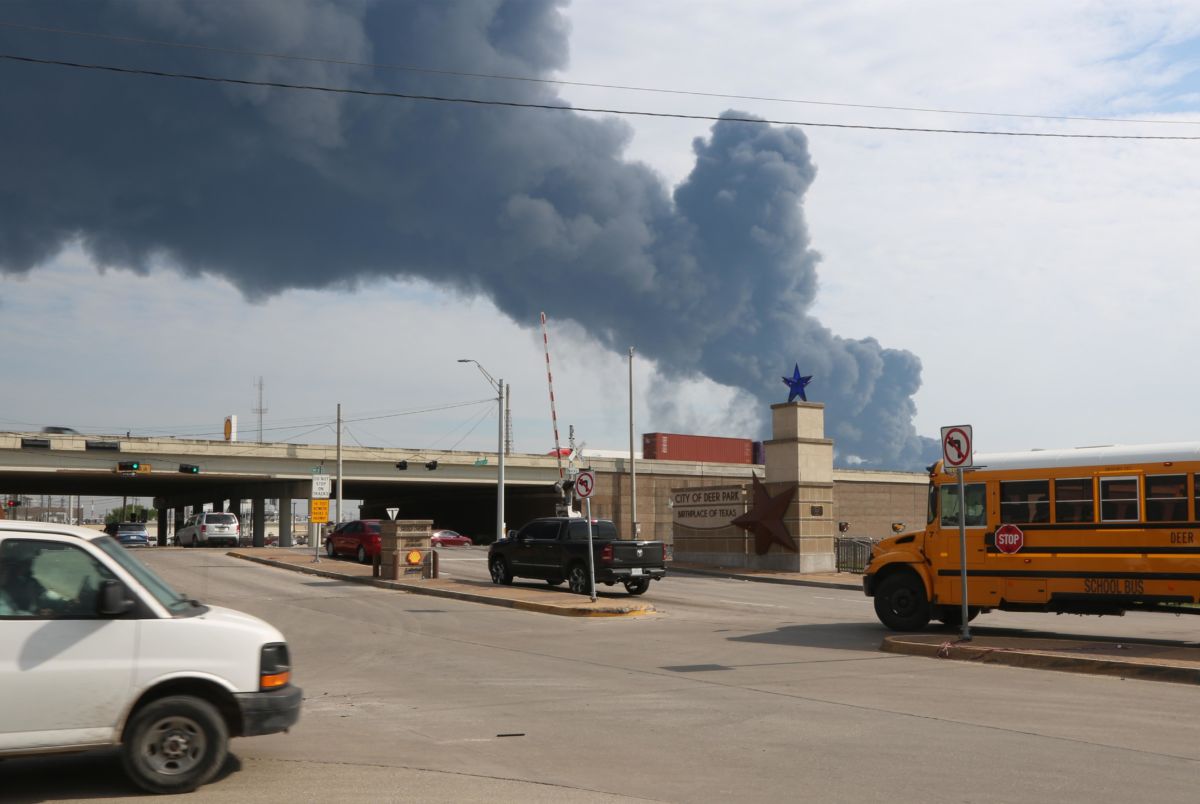Honest, paywall-free news is rare. Please support our boldly independent journalism with a donation of any size.

In the past month, Houston area-residents faced three major disasters related to oil and gas infrastructure. As a Houston resident, I was alarmed to see weekly news reports presenting the unknown dangers each fire posed to the community members living next door, and to those of us living just a few miles away. These facilities store and process various types of petrochemical products including feedstocks for plastics. Ethane, a fracked natural gas liquid, is one of the primary building blocks for plastics. In places like Houston, petrochemical facilities first crack (process) the ethane molecule into ethylene, using it to create polyethylene, today’s most commonly used plastic.
Above is a map of the three locations where fires associated with oil and gas infrastructure were located. Below is a timeline and description of each event.
Fire #1: On March 16th, Exxonmobil’s Baytown refinery caught fire for over four hours. A plume was visible over the skyline Saturday afternoon. Although dark smoke came from the facility, no shelter-in-place was issued for surrounding residents. According to statements from Exxon, the fire did not cause elevated levels of chemical pollution in the air. An ongoing investigation has not resulted in a known cause of the fire.
According to historical documents on the facility, this was the 9th major incident at the site in the last 10 years.
Fire #2: On March 17th, a fire erupted in Deer Park, Texas at the Intercontinental Trading Company (ITC) site, which created a plume that spread over 100 miles. ITC is a storage facility for the US Gulf Coast containing 242 storage tanks that store petrochemical liquids and gasses, as well as fuel oil, bunker oil, and distillates. Ten storage tanks were on fire for almost a week, resulting in days of closed schools for thousands of students, shelter-in-place orders for several surrounding communities due to elevated benzene levels, and a breach in a dike wall leading to thousands of toxic chemicals spilling into the ship channel.
Nearly a month later, federal officials from the U.S. Chemical Safety and Hazard Investigation Board and the Occupational Safety and Health Administration have now been allowed to enter the site to investigate how and why the fire started. The cause is still unknown.
ITC, with a long history of state and federal violations, is one of the many examples of how Texas puts the oil and gas industry ahead of the safety of its residents.
Fire #3: On, April 2nd, just three weeks after the Exxon and ITC fires, another fire broke out at the KMCO plant in Crosby that left one person dead and two others injured. Located just a 30-minute drive north of the previous fires, the facility caught fire and spread more toxic fumes over the Deer Park neighborhood previously contaminated by the fire at ITC. According to officials, a gas line caught fire near a tank full of isobutylene, a flammable gas used for rubbers, plastics, fragrances in fuels or pharmaceuticals.
The fire resulted in emissions of over 2,300 pounds of toxic chemicals including isobutylene, toluene, and other volatile organic compounds known to cause many health issues. Crosby residents suffer from a poverty rate twice that of the US at large and live in a region with elevated cancer risks. KMCO is one of the many contributors to cancer-causing agents in the region. And, similar to ITC, has repeatedly violated the Clean Air and Clean Water Act.
Unless Texas acts fast to put communities and the environment first, we will continue to see and experience incidents like these in Houston. Reports show that the greater Houston area suffers from major petrochemical disasters every six weeks. This is not a norm Houstonians want to accept. Given that Texas is currently going through its 86th legislative session, lawmakers should advocate for more corporate accountability and prevent further weakening of what few safety standards we currently have in place.
Trump is silencing political dissent. We appeal for your support.
Progressive nonprofits are the latest target caught in Trump’s crosshairs. With the aim of eliminating political opposition, Trump and his sycophants are working to curb government funding, constrain private foundations, and even cut tax-exempt status from organizations he dislikes.
We’re concerned, because Truthout is not immune to such bad-faith attacks.
We can only resist Trump’s attacks by cultivating a strong base of support. The right-wing mediasphere is funded comfortably by billionaire owners and venture capitalist philanthropists. At Truthout, we have you.
Our fundraising campaign is over, but we fell a bit short and still need your help. Please take a meaningful action in the fight against authoritarianism: make a one-time or monthly donation to Truthout. If you have the means, please dig deep.
